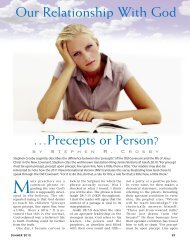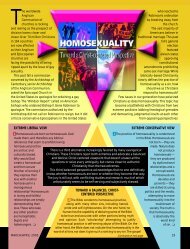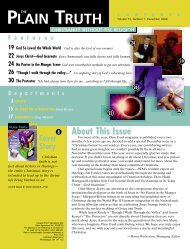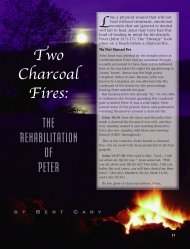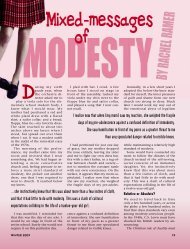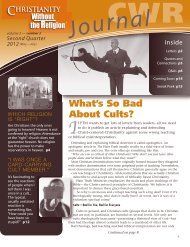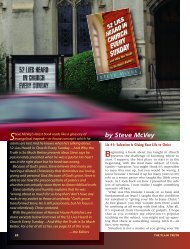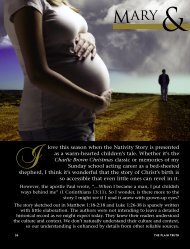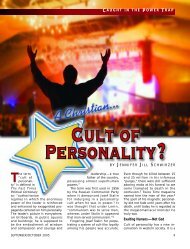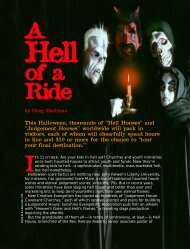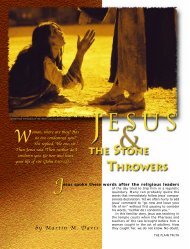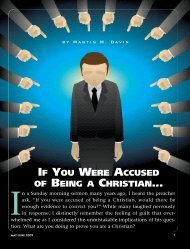THE MAN IN - Plain Truth Ministries
THE MAN IN - Plain Truth Ministries
THE MAN IN - Plain Truth Ministries
You also want an ePaper? Increase the reach of your titles
YUMPU automatically turns print PDFs into web optimized ePapers that Google loves.
<strong>THE</strong> <strong>MAN</strong> <strong>IN</strong><br />
Johnny Cash 1974<br />
In the early 1960s, the legendary<br />
musician Johnny Cash wrote a<br />
poem called “The Cost in Life,”<br />
about the tension generated by his<br />
compulsive sinning and persistent<br />
yearning for a purer life:<br />
When I consider why that I<br />
Live and love and work and die,<br />
And know no more than most are told<br />
Of new things…books and stories old.<br />
And why my Maker lets me live<br />
Why He gives the things he gives<br />
For I don’t follow many rules<br />
I often walk the way of fools.<br />
I often think, ‘Lord, why allow<br />
Me to live and prosper now’<br />
Then I know some time, some way,<br />
He’ll collect what I should pay.<br />
Why does he not snuff me out<br />
For I don’t know what life’s about<br />
The debt I owe for sin is high<br />
Still he lets me live, love, work and die.<br />
“Still he lets me live, love, work and die.”<br />
The final line encapsulates Cash’s ethos for<br />
6 <strong>THE</strong> PLA<strong>IN</strong> TRUTH
BLACK<br />
FOUND <strong>THE</strong> LIGHT<br />
by Patrick S. Durek<br />
CBS PHOTO ARCHIVE/GETTY IMAGES<br />
the last three-and-a-half decades of<br />
his life. When he longed to numb<br />
his pain with drugs—at times<br />
falling into relapse—he turned his<br />
focus to God, returning to sobriety.<br />
When his first marriage deteriorated<br />
into divorce, he found a soul<br />
mate to whom he devoted his undivided<br />
love. When failing health<br />
and the loss of friends and relatives<br />
could have justified retirement, he<br />
plunged himself into recording sessions.<br />
When he finally approached<br />
the end of life, he accepted release,<br />
telling his sister Joanne, “I can<br />
hardly wait to see Heaven, to see<br />
the Lord and to see our family.”<br />
Scraping the Filthy Bottom...of Life<br />
Johnny Cash, following thirty-five<br />
years of “scraping the filthy bottom<br />
of the barrel of life” (his<br />
words), was reborn and renewed<br />
through God’s grace. He was given<br />
a third of a century more to fulfill<br />
his life’s work, which consisted of<br />
spreading the message of Christ<br />
through a diverse media of film<br />
and television, fiction and audiobooks,<br />
and, of course, songs and<br />
concerts and recordings.<br />
“I clearly remember the first<br />
mood-altering drug to enter my<br />
body,” Cash wrote in 1997’s Cash:<br />
The Autobiography. After breaking a<br />
rib in a pre-adolescent, impromptu<br />
wrestling match, his doctor injected<br />
him with morphine, transforming<br />
the most excruciating pain<br />
into pleasure. “I thought, Boy, this<br />
is really something,” Cash<br />
wrote. “This is the greatest<br />
thing in the world, to<br />
make you feel so good<br />
when it was hurting so<br />
bad.” He used to tell himself,<br />
“God created this; it’s<br />
got to be the greatest thing<br />
in the world.”<br />
Over a decade later, at<br />
age 25, Cash discovered<br />
amphetamines (“It turned<br />
me on like electricity flowing<br />
into a lightbulb…”),<br />
then barbiturates (“…to<br />
stop the shaking from the<br />
amphetamines”). Johnny’s<br />
addiction, fueled by handfuls<br />
of stimulants and<br />
depressants, spiraled into a<br />
ferocious tornado that<br />
pulled him down, tore him<br />
away from his loved ones<br />
and from God.<br />
The drugs also clouded<br />
his mind, brushed a hazy<br />
film over his judgement,<br />
leading to recklessness. He did<br />
seven one-night stints in jail for<br />
misdemeanors, many of them<br />
auto-related. On one occasion,<br />
Cash drove his camper off the side<br />
of a deserted road, flipping over<br />
and sliding down the Santa Maria<br />
highway, fortunate to break only<br />
his jaw.<br />
Another time, Cash and his guitarist,<br />
Luther Perkins, nonchalantly<br />
crashed through the covered<br />
porch of the old Sahara Hotel, in<br />
Johnny Cash, following<br />
thirty-five years of “scraping<br />
the filthy bottom of the<br />
barrel of life” (his words),<br />
was reborn and renewed<br />
through God’s grace.<br />
W<strong>IN</strong>TER 2009 7
His addiction, fueled by handfuls of<br />
stimulants and depressants, spiraled<br />
into a ferocious tornado that pulled him<br />
down, tore him away from his loved<br />
ones and from God.<br />
Las Vegas. And one drive through<br />
Los Padres National Wildlife Forest<br />
ended in catastrophe. Neglected<br />
maintenance led to a cracked bearing<br />
that dripped scalding oil onto<br />
the cellophane-dry grass, bursting<br />
into flames and engulfing the forest.<br />
He was fined the equivalent of<br />
one million dollars. On another<br />
drive, an intoxicated Cash leapt<br />
out of his ’54 Plymouth just as it<br />
exploded. He had left open the<br />
valve on the propane tank in his<br />
trunk.<br />
In addition to putting his life at<br />
constant risk, he was an absent<br />
husband to his first wife, Vivian,<br />
and a negligent father. A blossoming<br />
performing career meant increased<br />
touring but also decreased<br />
domestic time. “It was a sad situation<br />
between Vivian and me,”<br />
wrote Cash in Autobiography, “I<br />
wasn’t going to give up the life<br />
that went with my<br />
music, and Vivian<br />
wasn’t going to accept<br />
that.” Around<br />
this time Cash also added alcohol<br />
to his inebriating repertoire. He illustrated<br />
the abyss into which he<br />
was sinking: “Vivian, my preacher,<br />
and some of my friends fought for<br />
me, trying to make me save myself,<br />
but that just infuriated me, and I<br />
started staying away from home<br />
even more.… All the time my<br />
habit just got worse.”<br />
And so did his professionalism.<br />
By 1967, an emaciated Cash was<br />
frequently canceling recording sessions<br />
and concerts, singing in a<br />
parched croak when he managed<br />
to sing at all. “I was a walking vision<br />
of death,” Cash wrote. “And<br />
that’s exactly how I felt.” His physical<br />
and spiritual destitution had<br />
reached its pinnacle. He had lost<br />
all desire to live.<br />
His “Circle of Faith”<br />
Cash drove his Jeep to Nickajack<br />
“The absolute lack of light was appropriate, for at that moment I<br />
was as far from God as I have ever been. My separation from Him,<br />
the deepest and most ravaging of the various kinds of loneliness<br />
I’d felt over the years, seemed finally complete.”<br />
Cave, thirty miles west of Chattanooga,<br />
intent on meeting his<br />
fate. In a 1995 interview for Journal<br />
of Country Music, Cash described<br />
the cataclysmic moment: “It just<br />
felt like I was at the end of the<br />
line…I hadn’t eaten in days, I hadn’t<br />
slept in days, and my mind<br />
wasn’t workin’ too good anyway. I<br />
couldn’t stand myself anymore. I<br />
wanted to get away from me. And<br />
if that meant dyin’, then OK, I’m<br />
ready. I just had to get away from<br />
myself.” He parked his Jeep at the<br />
foot of the cave and crawled as far<br />
into the abyss as the batteries in<br />
his flashlight allowed. And when<br />
they burned out—“I lay down to<br />
die in total darkness,” Cash wrote<br />
in Autobiography. “The absolute<br />
lack of light was appropriate, for at<br />
that moment I was as far from God<br />
as I have ever been. My separation<br />
from Him, the deepest and most<br />
ravaging of the various kinds of<br />
loneliness I’d felt over the years,<br />
seemed finally complete.”<br />
But at that point, perhaps hours<br />
or minutes away from Cash’s relinquishment<br />
of life, God intervened.<br />
As proclaimed in Ephesians 2:8<br />
(NKJV), “For by grace you have been<br />
saved through faith, and that not of<br />
yourselves; it is the gift of God.”<br />
Cash was overwhelmed. “I felt<br />
this great comfortin’ presence say-<br />
After receiving God’s grace in Nickajack Cave,... Despite<br />
setbacks and obstacles, he never lost faith in God’s love<br />
or in the redemptive power of Christ.<br />
8 <strong>THE</strong> PLA<strong>IN</strong> TRUTH
Inspired by Matthew<br />
25:36, “I was in prison,<br />
and you came to visit<br />
me,” Cash recorded two<br />
albums of live concerts for<br />
prisoners—At Folsom Prison<br />
and At San Quentin.<br />
In a 2002 interview with Rolling Stone,<br />
he noted that the popularity of the<br />
prison albums might be due to the<br />
universality of sin: “I think there’s a<br />
little bit of a criminal in all of us.<br />
Everybody’s done something they<br />
don’t want anybody to know about.”<br />
COLUMBIA RECORDS<br />
in’, ‘No, you’re not dyin’. I<br />
got things for you to do.’ So I<br />
got up, found my way out.<br />
Cliffs, ledges, drop-offs. I don’t<br />
know how I got out, ‘cept God got<br />
me out.”<br />
Johnny Cash began the arduous<br />
process of liberating himself from<br />
the drugs that had for years been<br />
his crutch, his escape from life’s<br />
pangs. His new love, June Carter,<br />
and her parents formed a “circle of<br />
faith” around him, shielding him<br />
from friends who were drug partners.<br />
June was relentless. “She’d<br />
take my drugs and throw them<br />
away,” Cash told Rolling Stone in a<br />
2000 interview. “And we’d have a<br />
big fight over it. I’d get some more,<br />
and she’d do it again. She’d lie to<br />
me. She’d hide my money. She’d<br />
do anything. She fought me with<br />
everything she had.”<br />
Connecting With God<br />
It was at this time that he began to<br />
reconnect with God. And with this<br />
connection came a catharsis: Vivian<br />
filed for divorce. Cash returned<br />
to the stage (sober) and<br />
recorded Live at Folsom Prison,<br />
which ignited his career. The Johnny<br />
Cash Show commenced. He married<br />
June. He had a son. And God<br />
became his central<br />
guiding light.<br />
Cash’s grace also initiated a period<br />
of intense spiritual contemplation,<br />
focusing on the Bible. Steve<br />
Turner, author of The Man Called<br />
Cash, writes: “[Cash] spoke most<br />
often of his spiritual pain. A battle<br />
waged within him, he said, between<br />
his divinely inspired desire<br />
to do right and his natural inclination<br />
to do wrong, between serving<br />
God and serving himself.” After<br />
decades of “wrong,” Cash, through<br />
faith, found fresh energy to do<br />
right. He wasted no time.<br />
Inspired by Matthew 25:36, “I<br />
was in prison, and you came to<br />
visit me,” Cash recorded two albums<br />
of live concerts for prisoners—At<br />
Folsom Prison and At San<br />
Quentin. In a 2002 interview with<br />
Rolling Stone, he noted that the<br />
popularity of the prison albums<br />
might be due to the universality of<br />
sin: “I think there’s a little bit of a<br />
criminal in all of us. Everybody’s<br />
done something they don’t want<br />
anybody to know about.”<br />
He also soon signed a deal with<br />
ABC to host a television variety<br />
show, The Johnny Cash Show.<br />
Michael Streissguth, in his book<br />
Johnny Cash, writes that the program,<br />
which aired from 1969 to<br />
1971, “spoke loudly and decisively<br />
on race, at least as loudly as<br />
Folsom and San Quentin had spoken<br />
on class and compassion.” In an<br />
early episode, Cash embraced<br />
African-American R&B singer<br />
O.C. Smith. A year later, following<br />
a performance by Ray Charles,<br />
Cash walked over and sat down beside<br />
him on the piano bench. To a<br />
recently-desegregated South, it was<br />
a profound statement. And when<br />
Cash thanked Charles “for bringing<br />
country music around the<br />
world,” it, too, broke racial barriers.<br />
Why Cash Was “The Man in Black”<br />
Perhaps the most memorable performance<br />
on The Johnny Cash Show<br />
was the premiere of the song “Man<br />
in Black,” for an episode filmed at<br />
Vanderbilt University. To a sea of<br />
college students, Cash sang about<br />
the reasons for his dark attire: He<br />
wore black “for the poor and beaten<br />
down,” “for the prisoner who<br />
has long paid for his crime, but is<br />
there because he’s a victim of the<br />
times,” “for the sick and lonely<br />
old,” and “for the reckless whose<br />
bad trip left them cold.” He wore<br />
black “for those who never read or<br />
listened to the words that Jesus<br />
said about the road to happiness<br />
J.T. PHILLIPS / SONY BMG MUSIC ENTERTA<strong>IN</strong>MENT<br />
Cash returned to the stage<br />
(sober)...He married June. He<br />
had a son. And God became his<br />
central guiding light... After<br />
decades of “wrong,” Cash,<br />
through faith, found fresh energy<br />
to do right. He wasted no time.
It was also on the (television] show that he<br />
professed his faith, shattering yet another steel<br />
door of taboo that television clung to like a security<br />
blanket. One was simply not supposed to refer to<br />
faith and oneself in the same sentence.<br />
ROB VERHORST/REDFERNS/GETTY IMAGES<br />
through love and charity,” and “in<br />
mournin’ for the lives that could<br />
have been. Each week we lose a<br />
hundred fine young men.” The<br />
song distills the essence of Cash’s<br />
new spirituality, comprising compassion<br />
for the poor and the imprisoned,<br />
love for the elderly and<br />
addicts, a faith-based anti-war ethic,<br />
and a devotion to spreading the<br />
word of Christ.<br />
It was also on the show that he<br />
professed his faith, shattering yet<br />
another steel door of taboo that<br />
television clung to like a security<br />
blanket. One was simply not supposed<br />
to refer to faith and oneself<br />
in the same sentence. ABC urged<br />
him not to make the declaration;<br />
Cash didn’t care. On the November<br />
19, 1970 show he said the<br />
following:<br />
“Well, folks, I’ve introduced lots<br />
of hymns and gospel songs on this<br />
show. I just want to make it clear<br />
that I’m feeling what I’m singing<br />
about in this next one. I am a<br />
Christian.... The number-one<br />
power in this world is God. The<br />
number-two power is Satan, and<br />
though he manages to fight for<br />
second in my life, I want to dedicate<br />
this song to the proposition<br />
that God is the victor in my life.<br />
I’d be nothing without Him. I<br />
want to get in a good lick right<br />
now for Number One.”<br />
Sharing the Gospel<br />
Though his TV show had garnered<br />
respectable ratings,<br />
ABC canceled the program a<br />
year later. And for Cash, as always,<br />
one door shut meant that another<br />
could be opened. He got to work<br />
on a film about the life of Christ<br />
called Gospel Road: A Story of Jesus.<br />
Filmed in Israel, it was cast primarily<br />
with family and friends (including<br />
June as Mary Magdalene and<br />
his pastor, Jimmy Snow, as Pontius<br />
Pilate) and narrated by Cash.<br />
Gospel Road was released by the<br />
Billy Graham Evangelistic Association<br />
(Graham had recently become<br />
a staunch friend of Cash), and<br />
was—and is—striking in its linking<br />
of Christ to contemporary culture.<br />
Author Michael Streissguth muses<br />
AMERICAN BROADCAST<strong>IN</strong>G CORPORATION<br />
“There’s preaching Christians, churchplaying<br />
Christians, and there’s<br />
practicing Christians,” he said.<br />
“And I’m trying very hard to be a<br />
practicing Christian.<br />
Johnny Cash 1994<br />
If you take<br />
the words of<br />
Jesus literally<br />
and apply them to<br />
your everyday life,<br />
you discover that the<br />
greatest fulfillment you’ll ever<br />
find really does lie in giving.”
SONY BMG MUSIC ENTERTA<strong>IN</strong>MENT<br />
on the crucifixion scene: “The<br />
image of Christ on the cross is<br />
transplanted from Golgotha to the<br />
smoggy, faceless cities of 1970s<br />
America, suggesting either that we<br />
continue to crucify Him or that the<br />
promise of His death lives with us<br />
even in modern times.”<br />
Cash had vociferously studied<br />
the Scriptures independently, but<br />
he yearned for even deeper study.<br />
Cash and June signed up for intensive<br />
Bible study at Christian International<br />
School of Theology. Two<br />
years later, in 1977, not only had<br />
he achieved an associate of theology<br />
degree, but he was also ordained<br />
as a minister. It is testament<br />
to Cash’s humility that even today<br />
few fans realize that he was ordained.<br />
With The Johnny Cash Show and<br />
Gospel Road, Cash had effectively<br />
used film to express his Christian<br />
compassion. Now, looking for<br />
something new, he turned to another<br />
medium—writing. In Autobiography<br />
Cash described the impetus<br />
to write a book: “The last of my<br />
correspondence [Bible-study]<br />
courses was on the life of St. Paul<br />
the Apostle, who fascinated me<br />
greatly, and eventually the thought<br />
occurred to me that I could do<br />
with his story what I’d done with<br />
that of Jesus in Gospel Road: tell it<br />
my way for my own benefit and<br />
that of anyone else who might be<br />
interested.” The result: a novel,<br />
Cash’s final decade<br />
featured a robust<br />
prolificacy of music....<br />
In less than a<br />
decade and until<br />
his death in 2003, he churned out five albums of new songs and<br />
covers. The songs on these final albums are steeped in<br />
reflections on life, suffering, love and faith.<br />
Man in White, published in 1986.<br />
The story of rabid anti-Christian<br />
Saul’s conversion into Paul the<br />
gospel-sowing Apostle evidently<br />
resonated with Cash. Just as Saul<br />
was redeemed through God’s grace<br />
and turned from sin to the sacred,<br />
Cash too was touched by Christ’s<br />
love, forsaking a wretched past for<br />
a pious present. It is, in short, a<br />
novel about instant redemption.<br />
By the mid-1980s, audiobooks<br />
had become a multi-billion dollar<br />
industry. People with neither the<br />
time nor the inclination to read<br />
opted to listen to recordings of<br />
books. In 1990, Johnny Cash<br />
recorded an audiobook of his reading<br />
the entire New Testament.<br />
Comprising sixteen CDs and nineteen<br />
hours, it was yet another new,<br />
creative way for Cash to spread the<br />
gospel.<br />
Cash’s final decade featured a robust<br />
prolificacy of music. In 1993,<br />
following a relatively quiet 1980s,<br />
rock producer Rick Rubin offered<br />
Cash an opportunity to sit down,<br />
sing and record “anything he<br />
wanted” on his American Recordings<br />
label. Cash accepted. In less than a<br />
decade and until his death in 2003,<br />
he churned out five albums of new<br />
songs and covers. The songs on<br />
these final albums are steeped in<br />
reflections on life, suffering, love<br />
and faith.<br />
Three Types of Christians<br />
Johnny Cash’s life story is a journey<br />
of sin to redemption made<br />
possible via God’s grace. After years<br />
of stubborn resistance, Cash surrendered<br />
completely to God’s will.<br />
That submission to God, and<br />
subsequent grace, would not have<br />
been possible had he not also accepted<br />
the anguish included with<br />
destiny. For much of his life, Cash<br />
suffered. He suffered from emotional,<br />
psychological and physical pain.<br />
In the first half of his life, he<br />
numbed the pain with pills, reckless<br />
behavior, infidelity and dishonesty.<br />
In the second half, he embraced the<br />
turbulence and turmoil as well as<br />
the blessings and gifts that God<br />
sent him. And the knowledge of<br />
his special mission gave him<br />
strength in times of doubt.<br />
...not only had he achieved an associate of theology<br />
degree, but he was also ordained as a minister. It is<br />
testament to Cash’s humility that even today few fans<br />
realize that he was ordained.<br />
AMERICAN RECORD<strong>IN</strong>GS
When he finally<br />
approached the end of<br />
life, he accepted<br />
release, telling his<br />
sister Joanne, “I can<br />
hardly wait to see<br />
Heaven, to see the Lord<br />
and to see our family.”<br />
Johnny Cash 1997<br />
© MARC BRYAN-BROWN/CORBIS<br />
“There are times that I<br />
want to go off into the<br />
woods and cry,” he once<br />
confessed, “because what<br />
I feel is too big a load for<br />
me to carry. We’re only<br />
called to be Christians,<br />
and I don’t feel any special<br />
calling, but I seem to<br />
have been given much<br />
by God. And much seems<br />
to be required of me.”<br />
Cash was also that rare<br />
breed of Christian who<br />
took seriously the words of Jesus,<br />
tirelessly striving to live the word,<br />
rather than just talk about it. He<br />
told Patrick Carr, in a 1979 interview<br />
for Country Music, about what<br />
he saw as a disheartening disconnect<br />
between many churches and<br />
society:<br />
“Like I say, the churches are full,<br />
but the slums and the ghettos are<br />
still full, and for the most part, the<br />
churches and the needy haven’t<br />
quite gotten together yet.… I<br />
mean, to go into a church is great,<br />
but to go out and put it all into action,<br />
that’s where it’s all at. And I<br />
haven’t seen a lot of action.”<br />
In a 1973 interview for Country<br />
Music, Cash talked about the “three<br />
types” of Christians.<br />
“There’s preaching Christians,<br />
church-playing Christians, and<br />
there’s practicing Christians,” he<br />
said. “And I’m trying very hard to<br />
be a practicing Christian. If you<br />
take the words of Jesus literally and<br />
apply them to your everyday life,<br />
you discover that the greatest fulfillment<br />
you’ll ever find really does<br />
lie in giving.”<br />
After receiving God’s grace in<br />
“There are times that I want to go off into the woods and<br />
cry,” he once confessed, “because what I feel is too big a<br />
load for me to carry... I seem to have been given much by<br />
God. And much seems to be required of me.”<br />
Nickajack Cave, Johnny Cash devoted<br />
every waking hour of his existence<br />
to giving. Despite setbacks<br />
and obstacles, he never lost faith<br />
in God’s love or in the redemptive<br />
power of Christ.<br />
The gifts he gave over his last<br />
three-and-a-half decades—songs<br />
by both himself and others; concerts<br />
for everyone<br />
from presidents to<br />
prisoners; recordings<br />
of old songs, new<br />
songs, gospel songs,<br />
and the New Testament;<br />
books about<br />
himself and about St.<br />
Paul; a film about<br />
Jesus Christ and a television<br />
program that<br />
showcased the rainbow<br />
of talents of God’s<br />
children; and the encouraging,<br />
humble statements of<br />
personal faith—all serve as testament<br />
that Johnny Cash was indeed<br />
a practicing Christian, a man who<br />
put faith in action. ❑<br />
BIBLIOGRAPHY:<br />
Carr, Patrick. “Johnny Cash’s Freedom.”<br />
Country Music (April, 1979).<br />
Cash, Johnny, and Patrick Carr. Johnny<br />
Cash: The Autobiography. New York: Harper<br />
Paperbacks, 1997.<br />
DeCurtis, Anthony. “Johnny Cash Won’t<br />
Back Down.” Rolling Stone (October 26, 2000).<br />
McCabe, Peter and Jack Killion. “Interview<br />
with Johnny Cash.” Country Music (May, 1973).<br />
Skanse, Richard. “The Man in Black Turns<br />
Seventy.” Rolling Stone (February 21, 2002).<br />
Streissguth, Michael. Johnny Cash: The Biography.<br />
New York: Da Capo Press, 2006.<br />
Tosches, Nick. “Chordless in Gaza: The<br />
Second Coming of John R. Cash.” Journal of<br />
Country Music, 17, 3 (1995).<br />
Turner, Steve. The Man Called Cash.<br />
Nashville, TN: W Publishing Group, 2004.<br />
Patrick S. Durek is a musician and<br />
music journalist who has written articles<br />
for a variety of publications,<br />
including Classical Guitar Magazine,<br />
The Home News Tribune,<br />
IAWM Journal and Sequenza21.<br />
He has a keen interest in topics<br />
relating to the overlap and cross<br />
pollination of music, religion and<br />
culture.<br />
12 <strong>THE</strong> PLA<strong>IN</strong> TRUTH



